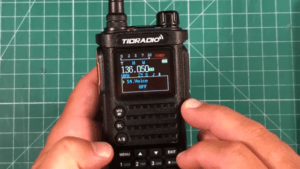The choice between Ham Radio and GMRS is a pivotal decision that rests upon a series of factors. From communication goals to technical interests and the commitment to acquiring a license, your choice will shape your communication experience. As we delve into the debate between these two avenues, let’s explore the nuances that define each, helping you make an informed decision that aligns perfectly with your needs.

Ham Radio and GMRS: A Detailed Comparison
Ham Radio and GMRS are both radio communication systems that operate in the UHF bands. Ham Radio operators have access to a broader range of frequencies (420-450 MHz), while GMRS users have a more limited range of frequencies (462-467 MHz). Let take a closer look to the unique features and benefits these systems offer.
Ham Radio
Ham Radio, also referred to as amateur radio, represents a captivating world of communication possibilities. Enthusiasts, often referred to as “hams,” delve into this realm to explore, experiment, and connect across vast distances. Operating within an expansive frequency range of 420-450 MHz, Ham Radio offers operators a playground for experimentation. This wide spectrum enables hams to engage in various communication modes, from voice transmission to digital data exchanges and even satellite communication.
One of the most captivating aspects of Ham Radio is its global recognition. Operators can initiate conversations with fellow hams worldwide, transcending geographical boundaries. This unique characteristic fosters cultural exchanges, learning experiences, and international friendships that extend beyond conventional communication methods. Additionally, Ham Radio serves as a crucial platform for emergency response activities. During natural disasters or crises, when conventional communication networks may fail, hams step in to provide essential communication links, aiding in disaster relief efforts.
GMRS
In contrast, GMRS (General Mobile Radio Service) caters to those seeking simplified communication within shorter distances. Operating within a narrower frequency range of 462-467 MHz, GMRS is often employed for localized interactions among family members, friends, and small groups. It offers a straightforward and efficient means of staying connected in outdoor activities, during family outings, or within a business setting.
The primary appeal of GMRS lies in its simplicity. This communication system is designed for easy operation, making it accessible to individuals without specialized technical knowledge. Unlike Ham Radio, which allows for an array of communication modes and experimentation, GMRS offers a streamlined communication experience. While its frequency range is limited, GMRS effectively serves its purpose of providing reliable short-range communication without the need for complex setups.
Factors to Consider When Choosing Between Ham Radio and GMRS
As you stand at the crossroads of selecting between Ham Radio and GMRS, it’s crucial to delve into the intricacies of each system. Making an informed decision requires a comprehensive understanding of various factors that influence your communication needs, technical comfort, and overall experience. Let’s delve deeper into these factors to illuminate the path ahead:
1. Communication Range: At the heart of any radio communication system lies the question of range. Ham Radio emerges as a frontrunner when it comes to long-range communication capabilities. Its extensive frequency range enables operators to establish connections spanning continents, making it an optimal choice for global networking. Additionally, Ham Radio finds its niche in emergency response scenarios, bridging communication gaps during natural disasters or times of crisis. On the other hand, GMRS is designed for local interactions within relatively shorter distances. If your communication needs extend beyond local circles, Ham Radio’s prowess in long-range communication might be your preferred choice.
2. Licensing Complexity: The pursuit of Ham Radio comes hand in hand with a notable caveat: the requirement of obtaining an amateur radio license. While this process involves mastering technical concepts and adhering to regulations, it grants access to a vast spectrum of frequencies and communication modes. In contrast, GMRS offers a simpler entry point. Depending on jurisdiction, GMRS may not require a license or involve a straightforward licensing process. If you value a more accessible entry into the world of radio communication, GMRS might be the better fit.
3. Ease of Operation: For some, the allure of radio communication lies in its simplicity. GMRS shines in this domain, being notably user-friendly and requiring minimal technical expertise. Operating GMRS radios is intuitive and straightforward, making it a great option for individuals seeking uncomplicated communication solutions. On the other hand, Ham Radio offers a broader spectrum of communication possibilities, which might necessitate a deeper understanding of radio technology. If your priority is ease of use, GMRS presents a clear advantage.
4. Community Engagement: The choice between Ham Radio and GMRS is more than a technical decision; it’s about finding a community that resonates with your interests. Ham Radio enthusiasts revel in a global community of operators who share their passion for experimentation, knowledge exchange, and event participation. The camaraderie among ham operators extends across borders, fostering international friendships. Conversely, GMRS often finds a home within families, small groups, and businesses seeking localized communication enhancement. If community engagement and a global network are appealing, Ham Radio provides a platform for meaningful connections.
Ham Radio Vs GMRS: Aligning with Your Needs
Ham Radio: Power, Flexibility, and Global Networking
Selecting between Ham Radio and GMRS hinges on understanding your communication requirements and preferences. Ham Radio’s vast frequency range and flexibility make it ideal for those who relish the prospect of global communication, technical experimentation, and active participation in a worldwide community.
Ham Radio provides operators with the freedom to explore a multitude of communication modes, from voice to digital transmission. Its remarkable flexibility is complemented by its capability for long-range communication, transcending geographical limits. Enthusiasts around the world unite under the banner of Ham Radio, fostering connections that traverse continents. Hobbyists, technology enthusiasts, and emergency responders find a common ground in this realm, sharing knowledge, participating in events, and contributing to emergency communication efforts. For those who seek a platform to connect with like-minded individuals on a global scale, Ham Radio offers an expansive stage.
However, Ham Radio’s capabilities come with a prerequisite—acquiring an amateur radio license. This entails mastering technical concepts, understanding regulations, and demonstrating proficiency in radio operation. This licensing process is a gateway to a wide spectrum of frequencies and communication possibilities. For those willing to invest the time and effort, Ham Radio delivers a realm of exploration and connectivity.
GMRS: Simplicity and Proximity
On the other hand, GMRS is tailored for individuals and groups seeking straightforward, short-range communication solutions. It doesn’t require the same level of technical expertise as Ham Radio, making it a convenient choice for family outings, group activities, and intra-group communication scenarios. GMRS is designed to cater to localized communication needs, making it an ideal choice for families, small groups, and businesses seeking to enhance communication within close proximity.
GMRS radios offer simplicity in operation, allowing individuals to communicate effortlessly without delving into complex technical intricacies. This ease of use makes GMRS accessible to a wide range of users, including those who prioritize straightforward communication solutions. Furthermore, in some cases, GMRS does not require a license, streamlining the process and making it a convenient choice for immediate communication needs.
For families embarking on outdoor adventures or businesses coordinating within a confined area, GMRS provides a reliable means of communication. Its focus on short-range communication makes it an invaluable tool for ensuring safety, coordination, and convenience.
Choosing Between Ham Radio and GMRS: A Personal Decision
The choice between Ham Radio and GMRS hinges on your unique needs, priorities, and aspirations. Are you seeking the ability to connect with individuals across the globe, explore various communication modes, and contribute to emergency response efforts? Ham Radio may be the path for you, offering a realm of possibilities that require dedication and a license.
Alternatively, if you’re looking for straightforward communication within a localized setting, GMRS offers simplicity and accessibility. It’s an optimal choice for families, small groups, and businesses seeking immediate and reliable communication.
In the end, the decision is personal and should be aligned with your communication goals, technical comfort, and desired level of engagement. Whether you choose Ham Radio’s vast possibilities or GMRS’s ease of use, both avenues serve as gateways to a world where communication knows no bounds.
Video: Whats The Difference Between HAM and GMRS? GMRS VS HAM VS CB Radio – Why GMRS Is Better Than HAM
